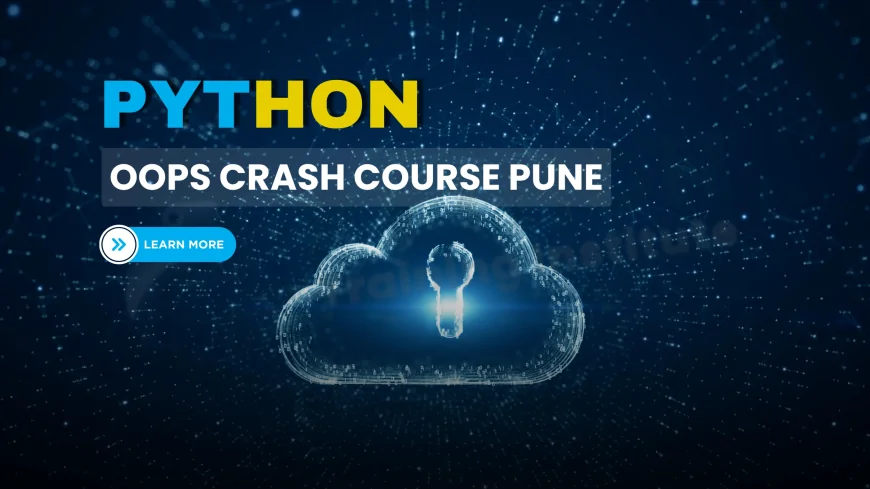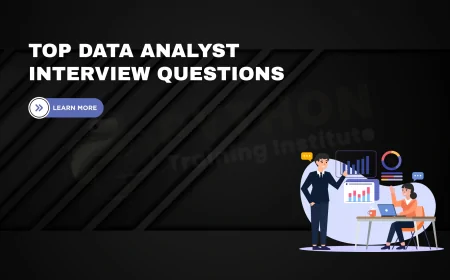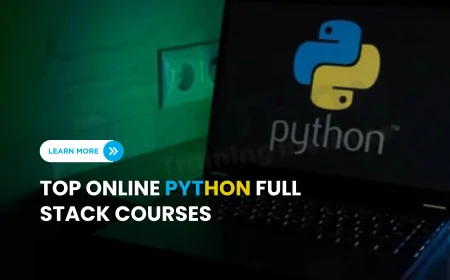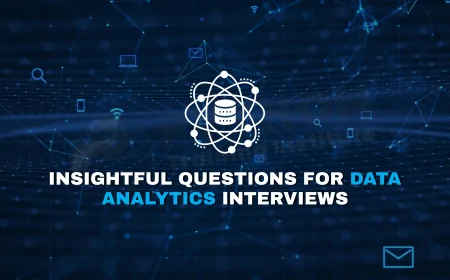Python OOPs Concepts Crash Course Pune | Python OOPs Training Bootcamp in Pune
Join the best Python OOPs concepts crash course in Pune. Learn classes, objects, inheritance, polymorphism, and real-world design patterns through hands-on projects and expert mentorship.

Table of Contents
- Why Learn OOPs in Python?
- Course Overview & Objectives
- Core OOP Concepts Explained
- Advanced Topics & Design Patterns
- Hands-On Labs & Projects
- Top Providers in Pune
- Career Benefits & Roles
- Format, Duration & Fees
- Who Should Attend?
- FAQs
- Conclusion
Why Learn OOPs in Python?
Object-Oriented Programming (OOP) is one of the most important paradigms in modern software development, and Python makes it incredibly accessible for both beginners and experienced developers. Here’s why learning OOPs in Python is a smart move, especially for students and professionals in Pune:
1. Builds Real-World Programming Skills
OOP helps you design software systems based on real-life objects. Whether you're building an e-commerce app, a banking system, or a machine learning model wrapper, OOP principles like classes and inheritance mirror real-world structures.
2. Encourages Code Reusability
With OOP, you write reusable code. Once a class is created, it can be used again in multiple parts of the application without rewriting logic—saving time and reducing errors.
3. Essential for Frameworks Like Django & Flask
Most Python web frameworks use OOP principles under the hood. Mastering OOPs is essential to fully understand and leverage frameworks like Django, Flask, FastAPI, and even data pipelines in Airflow.
4. In-Demand Skill in Pune’s Tech Industry
Python developers with solid OOPs knowledge are highly sought after by IT companies, startups, and MNCs in Pune for roles like backend developer, automation engineer, API specialist, and software architect.
5. Simplifies Complex Applications
OOP helps you manage complexity by dividing functionality into logical, isolated components. This makes large-scale apps easier to build, test, and maintain.
6. Prepares You for Coding Interviews
Many technical interviews in Python include OOPs-related questions—such as designing a class hierarchy, explaining polymorphism, or solving problems using encapsulation and abstraction.
7. Gateway to Advanced Concepts
Understanding OOPs sets the stage for learning advanced topics like design patterns, SOLID principles, and software architecture.
8. Makes You a Better Developer
By using OOPs properly, your code becomes cleaner, more organized, and scalable. This is a must-have trait for Python developers working in professional environments.
In summary, mastering OOPs in Python is not just about learning syntax—it’s about thinking like a software engineer. Whether you're aiming for a job in Pune's booming tech scene or want to build production-ready software, understanding Python’s OOP model is a crucial step forward.
Course Overview & Objectives
- Understand classes, objects, attributes, methods
- Implement Encapsulation, Abstraction, Inheritance, Polymorphism
- Learn design patterns: Singleton, Factory, Observer
- Apply OOP in real projects with coding labs
- Prepare for coding interviews: OOP questions in Python
Core OOP Concepts Explained
Classes & Objects
Define classes with methods, create instances, understand 'self'.
Encapsulation & Abstraction
Use private/protected attributes and interfaces to hide complexity.
Inheritance
Share methods/attributes in class hierarchies; super().
Polymorphism
Method overriding and duck typing to simplify code logic.
Advanced Topics & Design Patterns
- Magic Methods: __init__, __str__, __repr__, __add__, etc.
- Metaclasses: Classes that define classes
- Decorators: Class and method decorators
- Design Patterns: Singleton, Factory, Strategy, Observer
- SOLID Principles: Clean OOP architecture
Hands-On Labs & Projects
- Banking system with account classes, polymorphism
- Inventory manager with inheritance
- RESTful API using Flask OOP structure
- Chatbot with Strategy pattern
- ORM wrapper demonstrating Encapsulation
Top Providers in Pune
WebAsha Technologies Pune is one of the top-rated institutes offering a focused and practical Python OOPs Concepts Crash Course. Their course is tailored to professionals and beginners who want to master the foundational and advanced aspects of object-oriented programming using Python.
Why Choose WebAsha for Python OOPs in Pune?
- Comprehensive OOP Curriculum: Includes core principles like inheritance, encapsulation, polymorphism, abstraction, and advanced OOP topics like magic methods, decorators, and design patterns.
- Experienced Trainers: Led by certified Python developers with real-world backend and API development experience.
- Hands-On Projects: Build real applications such as an e-commerce backend, banking simulation, and object-based APIs using Flask and Django.
- Flexible Learning: Offers online, classroom, and weekend crash batches for working professionals.
- Career Support: Resume building, mock technical interviews, LinkedIn profile optimization, and job referrals.
Career Benefits & Roles
- Backend Developer
- Software Engineer
- API Developer
- System Architect
- Tech Lead
Salary expectations: ₹4–12 LPA for Junior/Senior roles.
Format, Duration & Fees
- Format: Live online, classroom, hybrid
- Duration: 4–8 weeks
- Fees: ₹10,000–₹30,000
- Batches: Weekday/weekend/fast-track
Who Should Attend?
- Beginners aiming for structured OOP learning
- Programmers needing to refine design skills
- Professionals targeting backend or API roles
- Candidates preparing for interviews
Frequently Asked Questions (FAQs)
1. What is OOP in Python?
Object-Oriented Programming (OOP) in Python is a paradigm that uses classes and objects to structure and organize code for reusability and scalability.
2. Is this crash course suitable for beginners?
Yes, the course is beginner-friendly and includes Python fundamentals before diving into OOP concepts.
3. What are the four pillars of OOP in Python?
The four core pillars are Encapsulation, Abstraction, Inheritance, and Polymorphism.
4. Do I need to know programming before enrolling?
Basic knowledge of Python is helpful but not mandatory. The crash course starts with foundational topics.
5. Will this course help me crack job interviews?
Yes, OOPs is a common topic in Python interviews. The course includes mock interviews and coding exercises.
6. What projects are included in the crash course?
Projects include building an inventory system, banking simulation, and a basic API with Flask using OOP structure.
7. What are Python classes and objects?
Classes are templates for creating objects, and objects are instances containing data and functions.
8. What is inheritance in Python?
Inheritance allows one class to inherit properties and behaviors (methods) from another class.
9. Can I take this course online from Pune?
Yes, most providers offer both online and offline learning modes including live classes and LMS support.
10. Are there any certifications after course completion?
Yes, a certificate of completion is awarded which can be added to resumes and LinkedIn profiles.
11. How long is the Python OOP crash course?
The course typically lasts 4 to 8 weeks depending on the batch type (weekend, regular, fast-track).
12. What tools or IDEs are used during training?
VS Code, PyCharm, and Jupyter Notebook are commonly used for writing and testing Python code.
13. Will I learn advanced OOP topics?
Yes, advanced topics like magic methods, decorators, and design patterns (Factory, Singleton) are included.
14. Is OOP used in frameworks like Django or Flask?
Yes, both Django and Flask are built around OOP principles like models, classes, and reusable views.
15. Can this course help me switch to backend development?
Absolutely. Mastering OOP is essential for roles like backend developer, API engineer, or system architect.
16. What is encapsulation in Python OOP?
Encapsulation is the bundling of data and methods that operate on the data, restricting direct access to some of the object's components.
17. Will I get placement support after the course?
Yes, institutes like WebAsha offer placement guidance, resume building, and interview prep.
18. Are there any real-world use cases discussed?
Yes, use cases from finance, e-commerce, and microservices are taught using OOP design.
19. How do I enroll for this course in Pune?
You can enroll by visiting the training provider’s website or contacting their admission team directly.
20. Can I repeat the sessions if I miss any?
Yes, most providers offer recorded sessions or backup classes for missed lessons.
Conclusion
This crash course delivers a powerful, hands-on approach to Python OOPs concepts. You'll emerge with foundational and advanced OOP mastery, practical coding skills, and confidence—ready to tackle real-world software challenges or excel in technical interviews. For those in Pune, these top-tier courses offer structured, job-aligned training. Enroll in an upcoming batch and make Python OOPs your competitive edge!
What's Your Reaction?
 Like
0
Like
0
 Dislike
0
Dislike
0
 Love
0
Love
0
 Funny
0
Funny
0
 Angry
0
Angry
0
 Sad
0
Sad
0
 Wow
0
Wow
0















